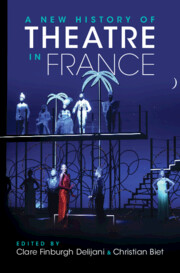Book contents
- A New History of Theatre in France
- A New History of Theatre in France
- Copyright page
- Dedication
- Contents
- Illustrations
- Contributors
- Acknowledgements
- Notes on the Text
- Introduction
- Chapter 1 The Performing Arts in Fifteenth- and Sixteenth-Century France
- Chapter 2 Drama during the Wars of Religion
- Chapter 3 Drama before Standardization
- Chapter 4 Neo-Classical Tragedy
- Chapter 5 Molière, a Man of the Stage?
- Chapter 6 Theatres as Economic Concerns
- Chapter 7 Seventeenth-Century Printed Theatre
- Chapter 8 Non-Official Eighteenth-Century Stages
- Chapter 9 The Expanded Theatre of the French Revolution
- Chapter 10 Nineteenth-Century Melodrama, Vaudeville and Entertainment
- Chapter 11 New Approaches to Women Actors and Celebrity in Nineteenth-Century France
- Chapter 12 Extended Romanticism in the Extended Nineteenth Century
- Chapter 13 Poetry in Action, 1945–1968
- Chapter 14 Performance and Installation Art
- Chapter 15 Twentieth- and Twenty-First-Century Theatre Directing
- Chapter 16 Political Theatre in France (1954–2020)
- Chapter 17 Liberating Third World Theatre
- Chapter 18 Francophone Theatre-Makers in France
- Chapter 19 Migration in Modern and Contemporary Playwriting
- Chapter 20 An Interview with Éric Ruf
- Chapter 21 An Interview with Magali Mougel
- Chapter 22 An Interview with Phia Ménard
- Bibliography
- Index
- References
Chapter 17 - Liberating Third World Theatre
Serreau, Kateb, Césaire and Genet
Published online by Cambridge University Press: 22 October 2024
- A New History of Theatre in France
- A New History of Theatre in France
- Copyright page
- Dedication
- Contents
- Illustrations
- Contributors
- Acknowledgements
- Notes on the Text
- Introduction
- Chapter 1 The Performing Arts in Fifteenth- and Sixteenth-Century France
- Chapter 2 Drama during the Wars of Religion
- Chapter 3 Drama before Standardization
- Chapter 4 Neo-Classical Tragedy
- Chapter 5 Molière, a Man of the Stage?
- Chapter 6 Theatres as Economic Concerns
- Chapter 7 Seventeenth-Century Printed Theatre
- Chapter 8 Non-Official Eighteenth-Century Stages
- Chapter 9 The Expanded Theatre of the French Revolution
- Chapter 10 Nineteenth-Century Melodrama, Vaudeville and Entertainment
- Chapter 11 New Approaches to Women Actors and Celebrity in Nineteenth-Century France
- Chapter 12 Extended Romanticism in the Extended Nineteenth Century
- Chapter 13 Poetry in Action, 1945–1968
- Chapter 14 Performance and Installation Art
- Chapter 15 Twentieth- and Twenty-First-Century Theatre Directing
- Chapter 16 Political Theatre in France (1954–2020)
- Chapter 17 Liberating Third World Theatre
- Chapter 18 Francophone Theatre-Makers in France
- Chapter 19 Migration in Modern and Contemporary Playwriting
- Chapter 20 An Interview with Éric Ruf
- Chapter 21 An Interview with Magali Mougel
- Chapter 22 An Interview with Phia Ménard
- Bibliography
- Index
- References
Summary
Examining and contesting the emergence of ‘third world theatre’ in the mid twentieth century, Brueton traces how Jean-Marie Serreau, the director feted for his inaugural productions of absurdist plays by Ionesco and Beckett, sought to disrupt the Eurocentric nihilism of the post-war dramatic canon. Serreau brought the anticolonial drama unfolding throughout the Empire to Parisian stages. Producing seminal works by the Algerian playwright Kateb Yacine, Martinican poet, playwright and politician Aimé Césaire, and French iconoclast Jean Genet, Serreau pursued a radical new humanism that aimed to decentre the intellectual and artistic hegemony of the West. He envisaged a third world theatre that would not only eschew the ghettoization of major Francophone playwrights but also contest the very values of colonial humanism that had developed under France’s Third Republic. Brueton compares Kateb’s representation of the anticolonial uprisings in Algeria in Le Cadavre Encerclé (The Encircled Corpse, 1958); Genet’s critique of French imperialism and Algerian neo-nationalism in Les Paravents (The Screens, 1966); and Césaire’s tragic exposition of Congolese independence from Belgium in Une saison au Congo (A Season in the Congo, 1967), to argue that they refuse forms of understanding where cultural difference is reduced to one decolonial agenda.
Keywords
- Type
- Chapter
- Information
- A New History of Theatre in France , pp. 329 - 346Publisher: Cambridge University PressPrint publication year: 2024

